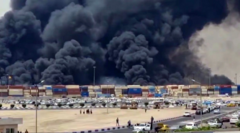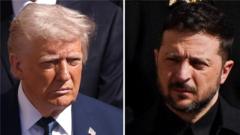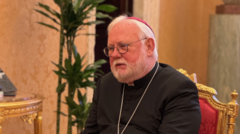The ceremonial reopening on Saturday marks a significant rebound for the iconic structure and aims to showcase France's resilience. However, Macron's political fortune remains tenuous following the recent government crisis.
Notre Dame Reopening: Macron Seeks Political Renewal Amid National Challenges

Notre Dame Reopening: Macron Seeks Political Renewal Amid National Challenges
French President Emmanuel Macron hopes to rejuvenate his political standing as Notre Dame Cathedral reopens five years after its devastating fire.
Amidst a backdrop of national uncertainty, Macron will leverage this historic event to portray a message of unity and hope, even as France grapples with profound challenges.
The reopening of Notre Dame Cathedral, scheduled for Saturday, serves as a strategic move for French President Emmanuel Macron, who is looking to regain support amidst political turmoil. The ceremony will be attended by prestigious international figures including US President-elect Donald Trump and Prince William, designed to present the cathedral’s restoration as a testament to France’s creative strength and resolve.
In his address for the occasion, Macron is expected to encourage the global community to recognize the determination and expertise that have brought about the cathedral's restoration over the past five years, despite the ongoing political turbulence following the resignation of Prime Minister Michel Barnier’s government.
This event marks a poignant moment since the fire on April 15, 2019, which led to significant damage, particularly to the medieval roof and spire. An extensive fundraising effort raised €850 million, facilitating a restoration that involved 2,000 skilled craftsmen and restorers, illustrating not only a recovery of a historical masterpiece but also an emblem of national pride.
However, the timing of this reopening coincides with a period of uncertainty in France, as the nation faces a backdrop of profound societal challenges. Despite the cathedral’s restoration being a symbol of achievement, Macron's government continues to wrestle with criticism, particularly regarding issues such as immigration policy and abortion rights, which have strained his rapport with the Catholic Church.
While the Archbishop of Paris, Laurent Ulrich, will lead the first mass on Sunday, Macron is expected to be notably absent from the inaugural address inside the cathedral due to secularism guidelines. His pre-emptive televised visit to thank the laborers involved in the restoration aims to preclude potential backlash about political opportunism tied to the ceremony.
Notably absent from the reopening celebrations is Pope Francis, who has expressed dissatisfaction with the French state’s policies. Though his absence might indicate a fraying relationship with the French government, he has shared a message meant to resonate during the event.
The reopening is designed to cater to a projected surge in visitors, shifting normalcy back to a site that drew approximately 12 million tourists a year prior to the fire. As the world looks on, Macron's success in leveraging this symbolic event for political gain remains to be seen against the backdrop of France's complex societal landscape.
The reopening of Notre Dame Cathedral, scheduled for Saturday, serves as a strategic move for French President Emmanuel Macron, who is looking to regain support amidst political turmoil. The ceremony will be attended by prestigious international figures including US President-elect Donald Trump and Prince William, designed to present the cathedral’s restoration as a testament to France’s creative strength and resolve.
In his address for the occasion, Macron is expected to encourage the global community to recognize the determination and expertise that have brought about the cathedral's restoration over the past five years, despite the ongoing political turbulence following the resignation of Prime Minister Michel Barnier’s government.
This event marks a poignant moment since the fire on April 15, 2019, which led to significant damage, particularly to the medieval roof and spire. An extensive fundraising effort raised €850 million, facilitating a restoration that involved 2,000 skilled craftsmen and restorers, illustrating not only a recovery of a historical masterpiece but also an emblem of national pride.
However, the timing of this reopening coincides with a period of uncertainty in France, as the nation faces a backdrop of profound societal challenges. Despite the cathedral’s restoration being a symbol of achievement, Macron's government continues to wrestle with criticism, particularly regarding issues such as immigration policy and abortion rights, which have strained his rapport with the Catholic Church.
While the Archbishop of Paris, Laurent Ulrich, will lead the first mass on Sunday, Macron is expected to be notably absent from the inaugural address inside the cathedral due to secularism guidelines. His pre-emptive televised visit to thank the laborers involved in the restoration aims to preclude potential backlash about political opportunism tied to the ceremony.
Notably absent from the reopening celebrations is Pope Francis, who has expressed dissatisfaction with the French state’s policies. Though his absence might indicate a fraying relationship with the French government, he has shared a message meant to resonate during the event.
The reopening is designed to cater to a projected surge in visitors, shifting normalcy back to a site that drew approximately 12 million tourists a year prior to the fire. As the world looks on, Macron's success in leveraging this symbolic event for political gain remains to be seen against the backdrop of France's complex societal landscape.






















